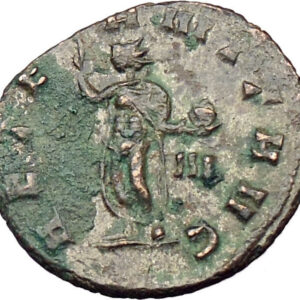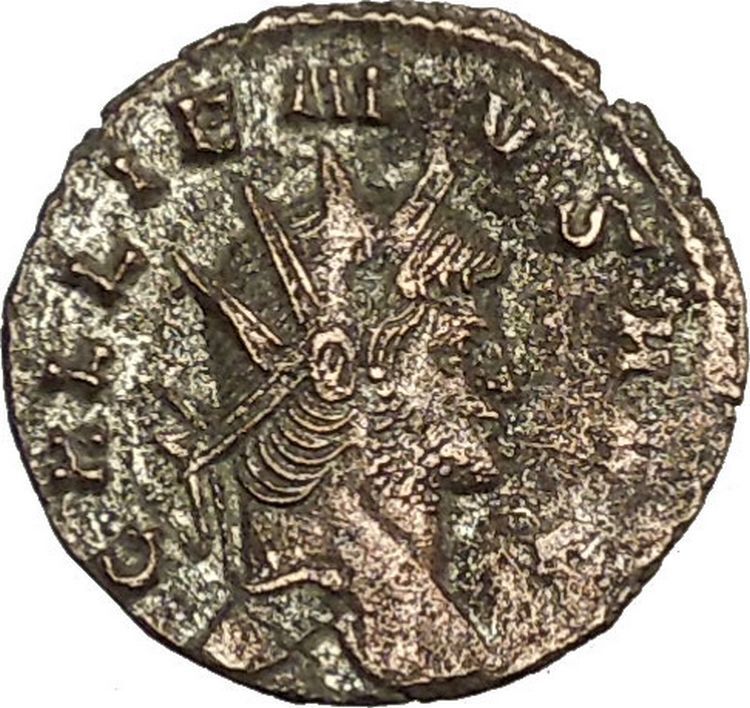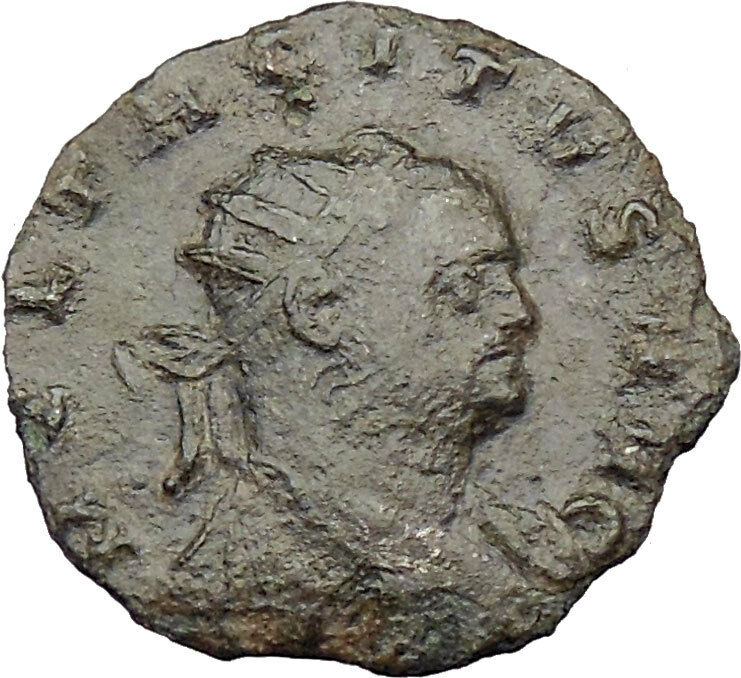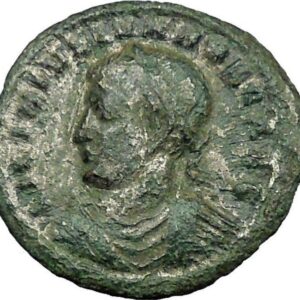|
Valentinian II – Roman Emperor: 375-392 A.D. –
Bronze AE4 13mm (1.04 grams) Thessalonica mint: 388-392 A.D.
Reference: RIC 26a, C 30
DNVALENTINIANVSPFAVG – Diademed, draped, cuirassed bust right.
SALVSREIPVBLICAE Exe: Chi-Rho/TESA – Victory advancing left, holding
trophy and dragging captive.
You are bidding on the exact item pictured,
provided with a Certificate of Authenticity and Lifetime Guarantee of
Authenticity.
The Chi Rho is one of the earliest
christograms
used by Christians. It is formed by superimposing the
first two letters in the Greek spelling of the word
Christ
(
Greek
: “Χριστός” ), chi=ch and rho=r, in such a way to produce
the monogram
☧. The Chi-Rho symbol was also used by pagan Greek scribes to
mark, in the margin, a particularly valuable or relevant passage; the relevant passage; the
combined
letters Chi and Rho standing for chrēston, meaning “good.” Although not technically a cross, the Chi Rho invokes the crucifixion
of Jesus as well as symbolizing his status as the Christ. There is early
evidence of the Chi Rho symbol on Christian Rings of the third century.
In
Roman mythology
, Victoria was the personification/Goddess of victory.
She is the Roman version of the
Greek goddess
Nike
, and was associated with
Bellona
. She was adapted from the
Sabine
agricultural goddess
Vacuna
and had
a
temple
on the
Palatine Hill
. Her name (in Latin) means victory. Unlike the Greek Nike, Victoria (Latin
for “victory”) was a major part of Roman society. Multiple temples were erected
in her honour. When her statue was removed in 382 AD by emperor
Gratianus
there was much anger in Rome. She was normally worshipped by
triumphant
generals returning from war. Also unlike the Greek Nike, who was known for success in athletic games such
as chariot races, Victoria was a symbol of victory over death and determined who
would be successful during war. Appearing on Roman coins, jewelry, architecture, and other arts, Victoria is
often seen with or in a
chariot
. An
example of this is her place upon the
Brandenburg Gate
in Berlin, Germany.
Flavius Valentinianus (371 – 15 May 392), known usually by his
anglicised
name, Valentinian II, was a
Roman Emperor
from 375 to 392.
//
 Early Early
Life and Accession (371-375)
Flavius Valentinianus was born to Emperor
Valentinian I
and his second wife,
Justina
. He was the half-brother of Valentinian’s other son,
Gratian
, who
had shared the imperial title with his father since 367. He had three sisters
Galla
, Grata and Justa. The elder Valentinian died on campaign in Pannonia
in 375. Neither Gratian (then in Trier) nor his uncle Valens (emperor for the
East) were consulted by the army commanders on the scene. Instead of merely
acknowledging Gratian as his father’s successor, Valentinian I’s generals
acclaimed the four-year old boy
augustus
on 22 November 375. The army may have been uneasy about
Gratian’s lack of military ability, and so raised a boy who would not
immediately aspire to military command.
Reign
from Milan (375-387)
Gratian, forced to accommodate the generals who supported his half-brother,
governed the trans-alpine provinces (including
Gaul,
Hispania
,
and Britain
), while Italy
, part of
Illyricum
, and
Africa
were under the rule of Valentinian. In 378, their uncle, the Emperor
Valens
, was
killed in battle with the
Goths
at
Adrianople
, and Gratian invited the general
Theodosius
to be emperor in the
East
. As a child, Valentinian II was under the influence of his
Arian
mother, the Empress Justina, and the imperial court at
Milan
, an
influence contested by the
Catholic
bishop
of
Milan, Ambrose
.
Justina used her influence over her young son to oppose the Catholic party
which was championed by Ambrose. In 385 Ambrose, backed by Milan’s populace,
refused an imperial request to hand over the
Portian basilica
for the use of Arian troops. In 386 Justina and Valentinian
received the Arian bishop
Auxentius
, and Ambrose was again ordered to hand over a church in Milan for
Arian usage. Ambrose and his congregation barricaded themselves inside the
church, and the imperial order was rescinded.
Magnus Maximus
used the emperor’s heterodoxy against him, and even his
eventual protector, Theodosius, cast aspersions on his Arianism. Valentinian
also tried to restrain the despoiling of pagan temples in
Rome. Buoyed by
this instruction, the pagan
senators
, led by
Aurelius Symmachus
, the
Prefect of Rome
, petitioned in 384 for the restoration of the
Altar of Victory
in the
Senate
House
, which had been removed by Gratian in 382. Valentinian, at the
insistence of Ambrose, refused the request and, in so doing, rejected the
traditions and rituals of pagan Rome to which Symmachus had appealed.
In 383, Magnus Maximus, commander of the armies in Britain, declared himself
Emperor and established himself in Gaul and Hispania. Gratian died while fleeing
him. For a time the court of Valentinian, through the mediation of Ambrose, came
to an accommodation with the usurper, and Theodosius recognized Maximus as
co-emperor of the
West
. However, in 386 or 387, Maximus crossed the
Alps into the
Po
valley and threatened Milan. Valentinian II and Justina fled to
Theodosius in
Thessalonica
. The latter came to an agreement, cemented by his marriage to
Valentinian’s sister
Galla
, to restore the young emperor in the West. In 388, Theodosius marched
west and defeated Maximus. Although he was to appoint both of his sons emperor (Arcadius
in 383, Honorius
in 393), Theodosius remained loyal to the dynasty of Valentinian I.
After the defeat of Maximus, Theodosius remained in Milan until 391.
Valentinian took no part in Theodosius’
triumphal celebrations
over Maximus. Valentinian and his court were
installed at
Vienne
in Gaul, while Theodoisus appointed key administrators in the West,
and had coins minted which implied his guardianship over the 17 year old.
Justina had already died, and Vienne was far away from the influence of Ambrose.
Theodosius’ trusted general, the
Frank
Arbogast
, was appointed
magister militum
for the Western provinces (bar Africa) and guardian of
Valentinian. Acting in the name of Valentinian, Arbogast was actually
subordinate only to Theodosius.
While the general campaigned successfully on the Rhine, the young emperor
remained at Vienne, in contrast to his warrior father and his older brother, who
had campaigned at his age. Arbogast’s domination over the emperor was
considerable, and the general even murdered
Harmonius
, a friend of Valentinian suspected of taking bribes, in the
emperor’s presence.
The crisis reached a peak when Arbogast prohibited the emperor from leading
the Gallic armies into Italy to oppose a barbarian threat. Valentinian, in
response, formally dismissed Arbogast. The latter ignored the order, publically
tearing it up and arguing that Valentinian had not appointed him in the first
place. The reality of where the power lay was openly displayed. Valentinian
wrote to Theodosius and Ambrose complaining of his subordination to his general.
In explicit rejection of his earlier Arianism, he invited Ambrose to come to
Vienne to baptize
him.
However, on 15 May 392, Valentinian was found hanged in his residence in
Vienne. Arbogast maintained that the emperor’s death was suicide. While our main
source, Zosimus
writing in the early sixth century from Constantinople, states that the Frank
had Valentinian murdered,
ancient authorities are divided in their opinion.
The young man’s body was conveyed in ceremony to Milan for burial by Ambrose,
mourned by his sisters Justa and Grata. The bishop’s eulogy is the only
contemporary Western source for Valentinian’s death.
It is ambiguous on the question of the emperor’s death, which is not surprising,
as Ambrose represents him as a model of Christian virtue. Suicide, not murder,
would make Ambrose dissemble on this key question.
At first Arbogast recognized Theodosius’s son Arcadius as emperor in the
West, seemingly surprised by his charge’s death.
After three months, during which he had no communication from Theodosius,
Arbogast selected an imperial official,
Eugenius
,
as emperor. Theodosius initially tolerated this regime but, in January 393,
elevated the eight year old Honorius as augustus to succeed Valentinian
II. Civil war ensued and, in 394, Theodosius defeated Eugenius and Arbogast.
Significance
Valentinian himself seems to have exercised no real authority, and was a
figurehead for various powerful interests: his mother, his co-emperors, and
powerful generals. Since the
Crisis of the Third CenturyDiocletian
and his collegiate system. While
Constantine
and his sons had been strong military figures, they had also
re-established the practice of hereditary succession, adopted by Valentinian I.
The obvious flaw in these two competing requirements came in the reign of
Valentinian II, a child.
His reign was a harbinger of the fifth century, when children or nonentities,
reigning as emperors, were controlled by powerful generals and officials.
|





 Early
Early 


